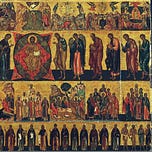Today, on the first Sunday after Pentecost, the Holy Church celebrates the memory of all saints. Just as Pentecost is not the pouring out of the Holy Spirit two millennia ago on the apostles only, but on the whole Church, that is to say, on us - now as then; in the same way the Feast of All Saints is not a memorial or a tombstone on the graves of some ancients, but a call to sanctity for us here and now. And if anyone is dead to this call, if anyone is a stranger to sanctity and considers it to be for someone else, in some other place, and at some other time, he must ask himself whether or not he is in the Church, the living and holy Body of Christ, or whether he is a tree that does not bring forth good fruit (Matt. 3:10). But what is sanctity? And what does it mean to partake in it?
The word saint (from the Latin sanctus) and its approximate equivalent holy (from the Old English hālig), much like the Greek ἱερός and ἅγιος and the Hebrew kedushah, have several closely related meanings. One of the primary meanings is “being separated or set aside for God.” Thus, anything that is sanctified for sacred use is holy: a holy temple, a holy chalice, or a holy icon. Christians are also holy, because they are separated, set aside, and sanctified for life in God. It is in this sense that the holy Apostle Peter calls all Christians “a chosen generation, a royal priesthood, an holy nation, a peculiar people” (1 Pet. 2:9).
The holiness of a Christian begins from his baptism, when he chooses Christ and is chosen by Christ, when a sinner in the world dies and a saint in the holy Body of Christ is born, when he is washed of his old corruption and dressed in the robe of righteousness, when he is anointed and tonsured as a sign of his being called to and set aside for the service of God. The Church gives each Christian a name as a claim of divine right and ownership over him. Each Christian is no longer a subject to the principalities, powers, the rulers of the darkness of this world, and spiritual wickedness in high places (Eph. 6:12), but is a subject of Christ, a servant of salvation, and a slave of eternal life.
We must remember, however, that Christ did not come to put us in shackles but to set us free. Life with God is a choice that must be made every day and every moment of every day. Indeed, one may wake up with a sincere intention to be a Christian, and yet fall into sin an hour later. A man who by sin chooses to separate himself from the Body of Christ and to live not according to the will of God but driven by his own passions, will necessarily be defiled and no longer suitable for the sacred service of salvation. In many ways we all fall short of the ideal, and all pray at confession for God to “reconcile and [re]unite” us to His Holy Church1, from which our fallen nature continuously tries to pull away. But there are sins due to our human weakness, and then there are those which we consciously choose, thus sending ourselves on a path away from God and defiling our baptismal garment. A church building that has been defiled by the godless can be restored and re-sanctified. But what will restore a heart that has turned away from God, or our inner temple of the Holy Spirit, which we ourselves continue to defile?
Listen to this episode with a 7-day free trial
Subscribe to Phroneo to listen to this post and get 7 days of free access to the full post archives.












